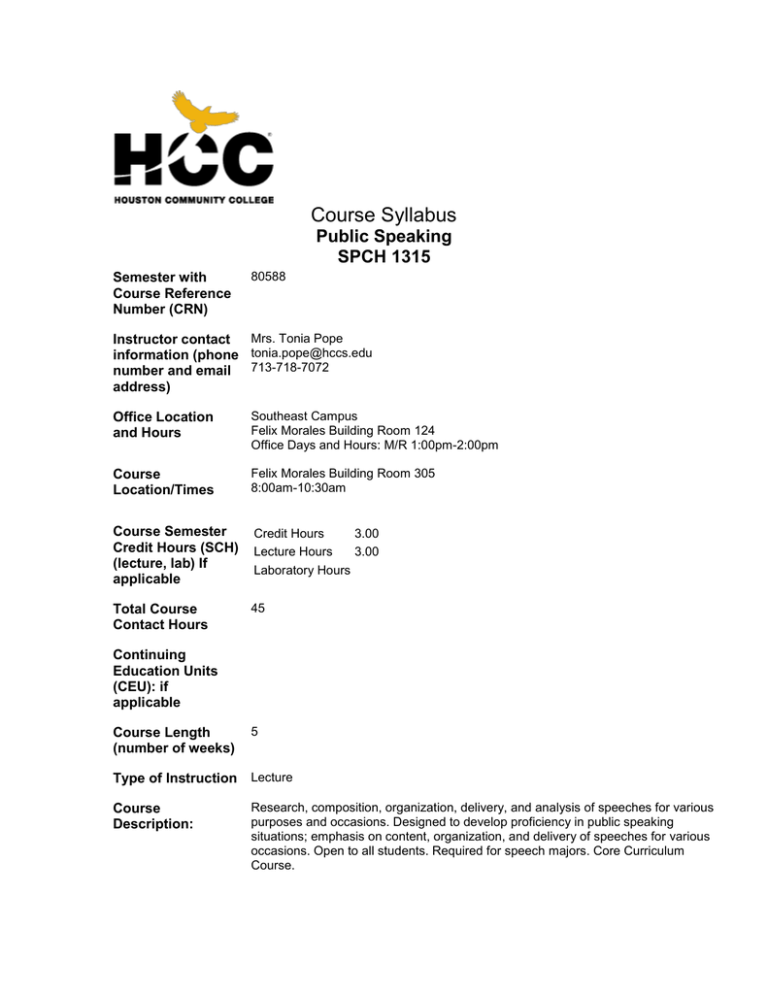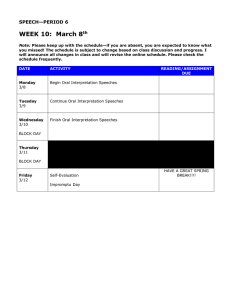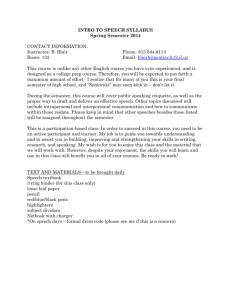cnetspeech131580588.doc
advertisement

Course Syllabus Public Speaking SPCH 1315 Semester with Course Reference Number (CRN) 80588 Instructor contact Mrs. Tonia Pope information (phone tonia.pope@hccs.edu number and email 713-718-7072 address) Office Location and Hours Southeast Campus Felix Morales Building Room 124 Office Days and Hours: M/R 1:00pm-2:00pm Course Location/Times Felix Morales Building Room 305 8:00am-10:30am Course Semester Credit Hours (SCH) (lecture, lab) If applicable Credit Hours 3.00 Lecture Hours 3.00 Laboratory Hours Total Course Contact Hours 45 Continuing Education Units (CEU): if applicable Course Length (number of weeks) 5 Type of Instruction Lecture Course Description: Research, composition, organization, delivery, and analysis of speeches for various purposes and occasions. Designed to develop proficiency in public speaking situations; emphasis on content, organization, and delivery of speeches for various occasions. Open to all students. Required for speech majors. Core Curriculum Course. Course Prerequisite(s) PREREQUISITE(S): SPCH 1311 or ENGL 1301 ENGL 1301 or Department Approval. Required for Speech Majors. FREQUENT REQUISITES Departmental approval College Level Reading College Level Writing Academic Discipline/CTE Program Learning Outcomes 1. Research and select appropriate source materials to develop ideas and support claims for oral presentations. 2. Deliver speeches and other oral presentations with structure, style, selfconfidence, and consistent eye contact. The latter will foster a speaker-audience connection. 3. Demonstrate an understanding of the cannon of public speaking, and be able to present prepared and impromptu talks. 4. Integrate the use of appropriate vocal and nonverbal techniques to enhance content. 5. Name and explain the different categories of speeches and delivery methods. 6. Recognize reasoning fallacies. 7. Work in groups or on teams as a member, and as leader-thinker. Course Student Learning Outcomes (SLO): 4 to 7 1. Analyze speeches, statements, and behaviors; orally and in writing; 2. *Prepare and present speeches and other presentations, using the appropriate verbal, oral, aural, and nonverbal communication skills; 3. *Compose and present a persuasive speech using logic and source materials to frame and support arguments. Other appeals and the use of appropriate verbal, oral, and aural communication skills should be use to effectuate audience influence. 4. Listen actively, critically and empathetically; 5. Identify various kinds of listeners; and 6. Distinguish types of speech delivery methods, and use them effectively. Learning Objectives (Numbering system should be linked to SLO e.g., 1.1, 1.2, 1.3, etc.) Analyze speeches, statements, and behaviors; orally and in writing; 1. Conduct discussions to help students evaluate diverse issues and topics. *Prepare and present speeches and other presentations, using the appropriate verbal, oral, aural, and nonverbal communication skills; 1. Employ exercises and assignments that will train students to properly structure oral presentations for formal and informal settings. *Compose and present a persuasive speech using logic and source materials to frame and support arguments. Other appeals and the use of appropriate verbal, oral, and aural communication skills should be use to effectuate audience influence. 1. Explain the use of different types of claims and ways to reason. Listen actively, critically and empathetically; Identify various kinds of listeners.; and Distinguish types of speech delivery methods, and use them effectively. SCANS and/or Core Curriculum Core Curriculum Competencies: Intellectual Competencies: If applicable Computer Literacy Intellectual Critical Thinking Intellectual Listening Intellectual Speaking Instructional Methods Face to Face Hybrid (50% or more) Distance (100%) Student Assignments Analyze speeches, statements, and behaviors; orally and in writing; Various assigned readings from textbooks, peer-rev Discussions Presentations Projects Speech analyses, special occasion speeches *Prepare and present speeches and other presentations, using the appropriate verbal, oral, aural, and nonverbal communication skills; No assignments selected for this outcome *Compose and present a persuasive speech using logic and source materials to frame and support arguments. Other appeals and the use of appropriate verbal, oral, and aural communication skills should be use to effectuate audience influence. No assignments selected for this outcome Listen actively, critically and empathetically; No assignments selected for this outcome Identify various kinds of listeners.; and No assignments selected for this outcome Distinguish types of speech delivery methods, and use them effectively. No assignments selected for this outcome Student Assessment(s) Analyze speeches, statements, and behaviors; orally and in writing; No assessments selected for this outcome *Prepare and present speeches and other presentations, using the appropriate verbal, oral, aural, and nonverbal communication skills; No assessments selected for this outcome *Compose and present a persuasive speech using logic and source materials to frame and support arguments. Other appeals and the use of appropriate verbal, oral, and aural communication skills should be use to effectuate audience influence. No assessments selected for this outcome Listen actively, critically and empathetically; No assessments selected for this outcome Identify various kinds of listeners.; and No assessments selected for this outcome Distinguish types of speech delivery methods, and use them effectively. No assessments selected for this outcome Instructor's Requirements: C Week 1 In-Class Lecture/Meeting In-Class Lecture/Meeting 06/06-Overview Syllabus & Course Calendar 06/07-Ice Breaker Student Introductions Overview Chapters 1 & 3 In-Class Lecture/Meeting Lecture/Meeting 06/08- Impromptu Speeches Overview Blackboard In-Class 06/09- Chapters 1-3 key terms, Class Activity Unit-1: discussion questions, and quizzes are due by 10:00p.m on 06/10 Week 2 In-Class Lecture/Meeting Lecture/Meeting 06/13-Perception Activity Storytelling Speeches Overview Storytelling Speech In-Class In-Class Lecture/Meeting Lecture/Meeting 06/15-Overview How to Structure a Speech Overview How to Overview chapters 2, 7-9, & 11-17 Speech In-Class 06/14- 06/16- Cont. Structure a Topics are due Week 3 No Class Meeting/Online Work No Class Meeting/Online Work 06/20-Midterm (online) is due by 1:00pm Study speech notes 25 questions (t/f and multiple choice questions) No Class Meeting/Online Work 06/22-Unit 2: Chapters 6-8 key terms, discussion questions, and quizzes are due by 10:30a.m. 06/21- Unit-1: Chapters 4-5 key terms, discussion questions, and quizzes are due by 10:30a.m. No Class Meeting/Online Work 06/23- Unit 2: Chapters 9-11 key terms, discussion questions, and quizzes are due by 10:30a.m. Week 4 In-Class Lecture/Meeting 06/27- Informative Speeches No Class Meeting/Online Work 06/29-Units-3, 4, & 5: Chapters 12-19 key terms, discussion questions, and quizzes are due by 10:30a.m. Week 5 In-Class Lecture/Meeting 06/28Informative Speeches No Class Meeting/Online Work 06/30- Units 6 & 7: Chapters 2025 key terms, discussion questions, and quizzes are due by 10:30a.m. (there are no key terms for chapter 22) No Class Lecture/Meeting 07/04- No School- Holiday No Class Meeting/Online Work 07/05-Unit 8: Chapters 26-35 key terms, discussion questions, and quizzes are due by 10:30a.m. (there are no key terms for chapter 30) No Class Meeting/Online Work 07/06- Final Exam (online) is due by 1:00pm Study quizzes (chapters 1, 3, 4, 5, 6, 13, 14, 15, 16, 17, 18, 19, 23, & 24) 50 questions (t/f questions) Program/Discipline 1. Identify and explain the components of the communication process and the role they play in human interactions. Requirements: If applicable 2. Deliver informative and persuasive oral presentations that are consistent with and appropriate for the audience and purpose. 3. Identify, evaluate, and utilize evidence to support claims used in presentations and arguments. 4. Discuss the major types of interpersonal relationships, and how conflict and power issues can be handled effectively with communication. 5. Effectively communicate and interact with others in interpersonal, personal and professional situations. 6. Demonstrate through performance and analysis the importance of both verbal and nonverbal communication. 7. Work as a productive team member as either a leader or follower. HCC Grading Scale A = 100- 90 B = 89 - 80: C = 79 - 70: D = 69 - 60: 59 and below = F 4 points per semester hour 3 points per semester hour 2 points per semester hour 1 point per semester hour 0 points per semester hour IP (In Progress) 0 points per semester hour W(Withdrawn) 0 points per semester hour I (Incomplete) 0 points per semester hour AUD (Audit) 0 points per semester hour IP (In Progress) is given only in certain developmental courses. The student must re-enroll to receive credit. COM (Completed) is given in non-credit and continuing education courses. To compute grade point average (GPA), divide the total grade points by the total number of semester hours attempted. The grades "IP," "COM" and "I" do not affect GPA. See "Health Science Program/Discipline Requirements" for grading scale. Instructor Grading Criteria The grading criterion for Public Speaking is based on points. 900-1000 points=A 600-699 points=D 800-899 points=B 700-799 points=C Below 600 points=F Self Intro Speech (Partners) 5pts Impromptu Speech 15pts Perception Activity 10pts Storytelling Speech 55pts Informative Speech 250pts Midterm 50pts Final 50pts Quizzes (35) 5 pts each quiz 175pts Key Terms (33) 5 pts per chapter 165pts (there are no key terms for chapters 22 &30) Discussion Questions (35) 5 pts per chapter 175pts Attendance (based on 10 days) 5pts each day 50ts Total Points 1000pts Instructional Materials O’Hair, D., Rubenstein, H., & Stewart, R. (2010). A pocket guide to public speaking (3rd ed.). Bedford/St. Martin’s. HCC Policy Statement: Access Student Services Policies on their Web site: http://hccs.edu/student-rights Distance Education and/or Continuing Education Policies Access DE Policies on their Web site: http://de.hccs.edu/Distance_Ed/DE_Home/faculty_resources/PDFs/DE_Syllabus.pdf Access CE Policies on their Web site: http://hccs.edu/CE-student-guidelines



